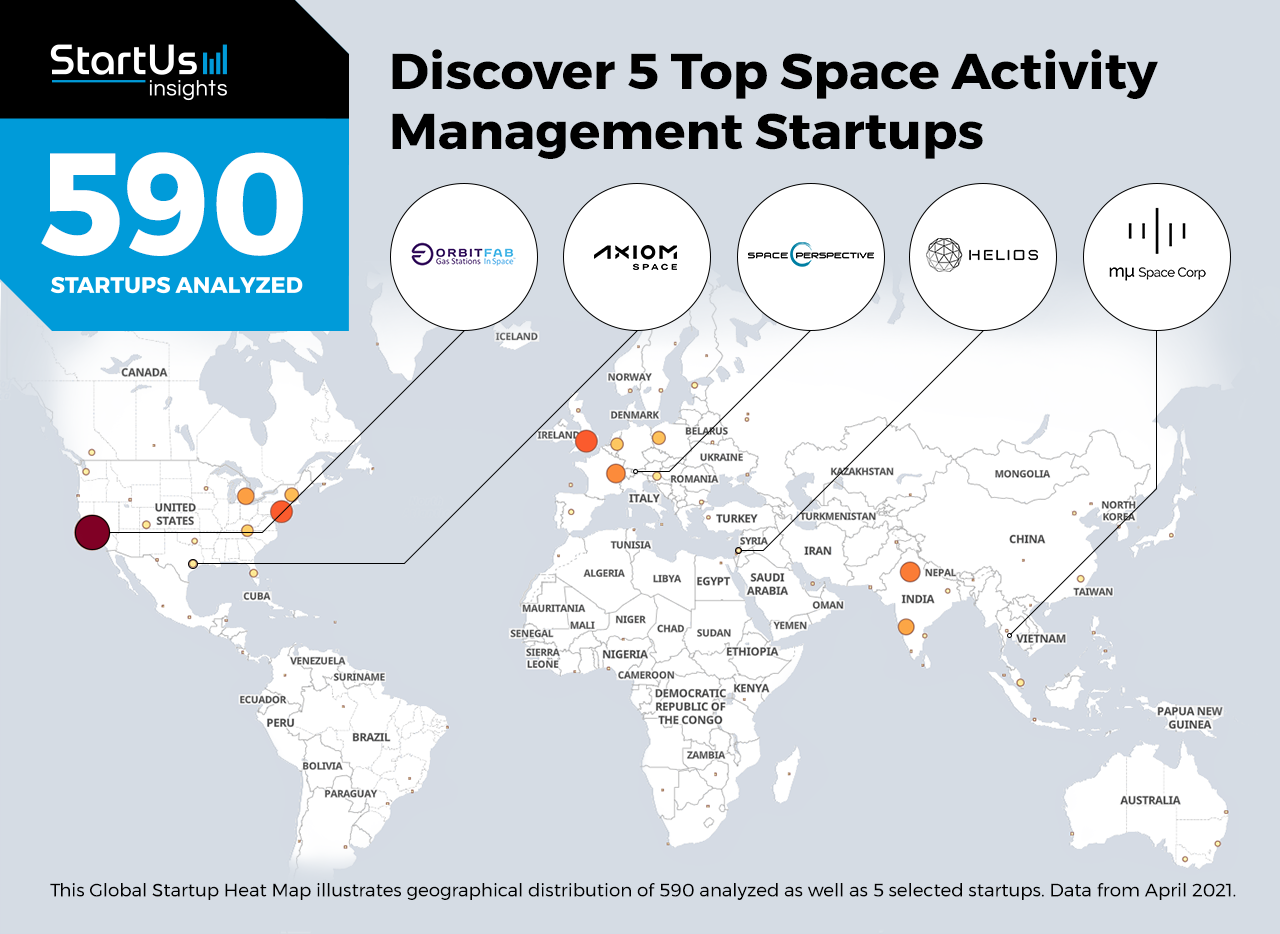Staying ahead of the technology curve means strengthening your competitive advantage. That is why we give you data-driven innovation insights into the space industry. This time, you get to discover 5 hand-picked space activity management startups.
Global Startup Heat Map highlights 5 Top Space Activity Management Startups out of 590
The insights of this data-driven analysis are derived from the Big Data & Artificial Intelligence-powered StartUs Insights Discovery Platform, covering 1.379.000+ startups & scaleups globally. The platform gives you an exhaustive overview of emerging technologies & relevant startups within a specific field in just a few clicks.
The Global Startup Heat Map below reveals the distribution of the 590 exemplary startups & scaleups we analyzed for this research. Further, it highlights 5 space activity management startups that we hand-picked based on criteria such as founding year, location, funding raised, and more. You get to explore the solutions of these 5 startups & scaleups in this report. For insights on the other 585 space activity management solutions, get in touch.
Orbit Fab builds Gas Stations in Space
After space satellites reach their end-of-life, most of them remain in orbit, contributing to space debris. The increasing amount of space debris poses a risk to future space missions. Emerging SpaceTech solutions seek to produce energy directly in space. These include solar-based power stations and space-based refueling technologies. Startups even develop gas stations in space to provide fuel to space vehicles, as required.
Orbit Fab is a US-based startup working towards the development of gas stations in space for satellite refueling. These gas stations supply satellite propellants in the earth’s orbit and, hence, expand the operational potential of new and existing space assets. This also helps in tackling any unprecedented and sudden glitches in the vehicle, for example, if it runs out of fuel.
Helios offers In-Situ Resource Utilization
To set up a base on another planet, settlers will need resources to build structures, as well as to sustain themselves. However, weight is a crucial limiting factor for cost-efficient space travel. With every kilogram of extra weight, the fuel requirement also increases astronomically. To this end, startups are working on in-situ resource utilization solutions to reduce costs.
Israeli startup Helios works on technologies for in-situ resource utilization. The startup’s electrolysis reactor is designed to extract oxygen and various metals from oxides in martian and lunar surfaces. Using different fabrication methods, the reactor turns metal into various infrastructure components. The startup’s solutions also aim to channel and store oxygen for later use in accommodation and propellants.
Space Perspective builds a Space Balloon
The prospect of space travel continues to fascinate humanity. By addressing the challenges related to human space exploration, space technology expands as new innovations in the energy sector, earth sciences, and materials industry. Moreover, SpaceTech also helps foster peaceful collaborations among all nations. Space travel inculcates the urge to study space science among commoners, potentially opening lucrative opportunities in the space industry.
Space Perspective is an Austrian startup aiming to enable people to travel to and from the edge of space. The startup’s spacecraft offers travel experiences for off-world explorers. Unlike other startups, which focus on harnessing the latest propulsion technology or rocket busters, the company uses a pressurized capsule technology and a high-altitude balloon to chauffeur tourists to the edge of space.
Axiom Space develops Commercial Space Infrastructure
The International Space Station (ISS) is unlikely to last another 20 years. Funding for the space station is scheduled to reduce over the next decade. NASA and other international partners have guaranteed support for the ISS only until 2024. Hence, startups and companies are pooling in with ISS to develop their own privately-operated commercial space stations to replace ISS.
Axiom is a US-based startup working towards a commercial space station to provide more living and research space for astronauts in space. The Axiom Station will orbit 250 miles above the Earth’s surface and host commercial laboratory and residential infrastructure. It will open microgravity experiments and critical space-environment materials testing to private and professional astronauts.
mu Space Corp sets up Space Internet Data Centers
Data centers occupy considerable land on earth, as well as incurs high costs to maintain. The major expenses come in the form of establishing and maintaining cooling systems that need to work round-the-clock. Hence, space startups are developing space-based data centers that do not require land or separate cooling systems. This encourages data management startups to take advantage of the considerably low temperatures in outer space.
Thai startup mu Space Corp develops an internet data center for the constellation of small low earth orbit (LEO) satellites. The startup’s data center offers efficient cooling performance due to its establishment in outer space. Apart from this, the space data processing is fast, accurate, easily disseminated globally, and maintains all space-related IT operations.
Discover more SpaceTech startups
The 590 space activity management startups, such as the 5 examples highlighted in this report, focus on space infrastructure and travel solutions. While all of these technologies play a major role in advancing SpaceTech, they only represent the tip of the iceberg. To explore more space-related technologies, simply get in touch to let us look into your areas of interest. For a more general overview, you can download our free Industry Innovation Reports to save your time and improve strategic decision-making.










